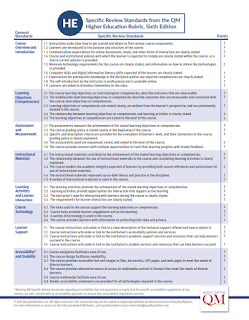By now you've likely heard of Quality Matters. But what is it, where did it come from, and why is it important? First, a little background.
Where Did It Come From?
According to their web site, Quality Matters began with a small group of colleagues in the MarylandOnline (MOL) consortium who were trying to solve a problem among institutions: how do we measure and guarantee the quality of a course? This question was especially important as institutions began to create a system where they could share available seats in their online courses with other institutions. They needed a way to ensure course quality — that courses would be equivalent — for their students, regardless of where the course originated. In 2003, MOL outlined how the Quality Matters program could create a scalable process for course quality assurance, and applied for a Fund for the Improvement of Postsecondary Education (FIPSE) grant from the U.S. Department of Education.
Fast forward sixteen years and QM now partners with nearly 1,100 colleges, universities, and technical schools across the world - representing 11 countries. In the US, all 50 states plus the District of Columbia and Puerto Rico have subscribing institutions.
How Does It Work?
The QM review process is collegial. Qualified, experienced course reviewers work in teams of three to review courses based on eight general standards and 42 specific standards. The eight General Standards are as follows:
- Course Overview and Introduction
- Learning Objectives (Competencies)
- Assessment and Measurement
- Instructional Materials
- Learning Activities and Learner Interaction
- Course Technology
- Learner Support
- Accessibility and Usability
Quality Matters 6th Edition Rubric
Click for Larger View
Click for Larger View
Is This The Only Rubric?
There are actually several similar rubrics, including Blackboard’s Exemplary Course Program Rubric; the California Community Colleges’ Online Education Initiative (OEI) Course Design Rubric; The Open SUNY Course Quality Review Rubric (OSCQR);
The Illinois Online Network’s Quality Online Course Initiative (QOCI); and the California State University Quality Online Learning and Teaching (QOLT). Each has their own strengths and weaknesses, but along with the OSCQR, Quality Matters stands out as one of the most recognized and respected assurance rubrics.
Why Is It Important?
Multiple studies have found that course quality contributes to improvements in student persistence and retention. A recent study in California found that when colleges focus on improving course design and extend meaningful support services, student outcomes improve dramatically. Consider the California Community College system and their improved outcomes, where their most recent distance education report shows system-wide closing of the achievement gap between face-to-face and online students.
EDUCAUSE also found similar success criteria in a study conducted among 200 undergraduates students who were exposed to the Quality Matters rubric. Faculty that adopt the standards will likely find that not only will their course quality improve, but the students will be more likely to persist and be successful in their course. Accrediting organizations such as the Higher Learning Commission (HLC) are taking notice as well. Review teams now routinely ask representatives at campuses they are accrediting whether or not they are using a quality assurance process and what that process is. Moreover, they sometimes request evidence that the assurance process is being utilized. Is it important? The accreditation organizations seem to think so.



No comments:
Post a Comment